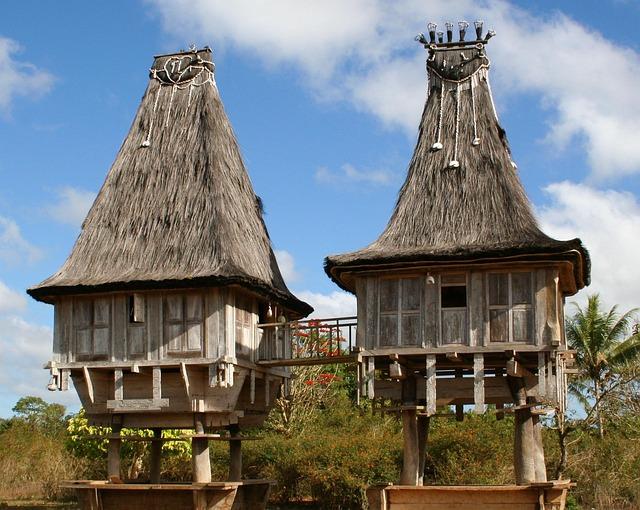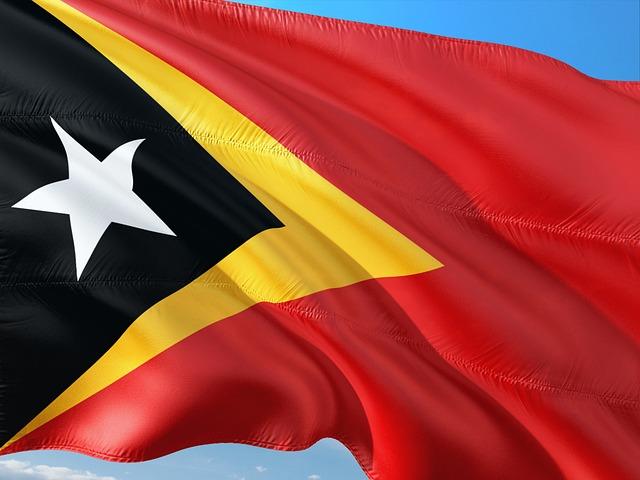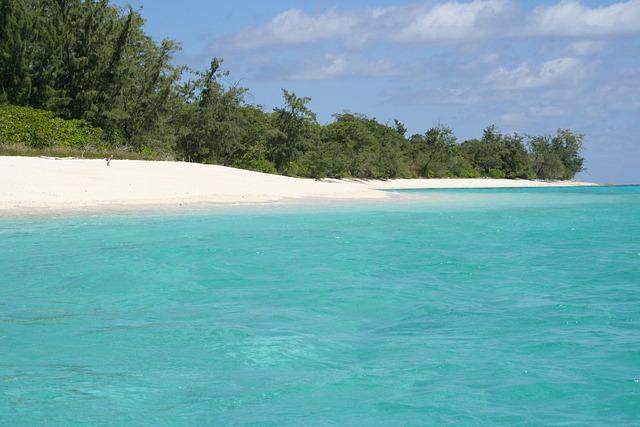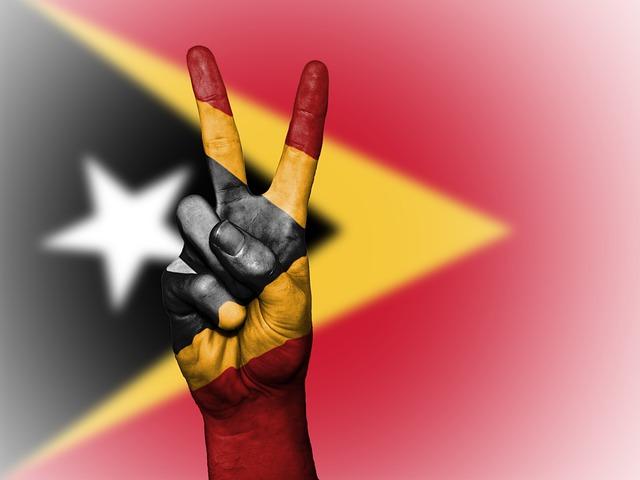In a poignant reflection on the significance of East Timor’s struggle for sovereignty, United Nations Secretary-general António guterres hailed the nation’s independence as a “gift to the world.” Speaking at a commemorative event, Guterres emphasized the broader implications of East Timor’s journey toward self-determination, underscoring the resilience of its people and the worldwide principles of freedom and justice. His remarks come as the world marks meaningful milestones in the region’s history, shedding light on ongoing challenges and the importance of supporting emerging democracies.As East Timor continues to navigate its path in the international community, Guterres’ words resonate with a call for solidarity and recognition of the rights of all nations to define their destinies. This article explores the ancient context of East Timor’s fight for independence, its implications for global governance, and the role of the international community in fostering peace and democracy.
UN Chief Highlights Significance of East Timor’s Independence on Global Stage
The Secretary-General of the United Nations, antónio Guterres, recently emphasized the profound impact of East Timor’s independence, asserting that it serves as a critical exmaple of perseverance and resilience in the global quest for self-determination. Since gaining independence in 2002, East Timor has navigated significant challenges while striving to build a prosperous and peaceful society. Guterres pointed out that the nation’s journey is not only a testament to its people but also a source of inspiration for others facing similar struggles for sovereignty worldwide.
during remarks made at a commemoration event, Guterres outlined the broader implications of East Timor’s independence, stressing the importance of supporting emerging democracies. He highlighted several key takeaways, including:
- Empowerment of Local Governance: Strengthening institutions to foster effective self-rule.
- Promotion of peace and Stability: Building a nation that advocates for non-violence and conflict resolution.
- Global Solidarity: Encouraging international support for nations striving for independence.
Such reflections underscore the role of East Timor as a living narrative of triumph, inspiring global dialogues about freedom, equity, and the collective obligation to aid those yearning for self-governance.

Historical Context of East Timor’s Struggle for Sovereignty
East Timor, a small nation located in Southeast Asia, has a complex and tumultuous history that has profoundly shaped its struggle for sovereignty. Following centuries of Portuguese colonization, the island experienced a brief period of independence in 1975, only to be invaded by Indonesia shortly after. This invasion marked the begining of a brutal occupation that lasted for a quarter of a century, during which the East Timorese endured significant human rights abuses and violence. The international community largely ignored these atrocities at the time, viewing East Timor as a geopolitical pawn in the Cold War. Despite these challenges, the desire for self-determination remained a constant theme throughout the nation’s struggle.
The turning point came in the late 1990s, fueled by a combination of internal resistance movements and international pressure for human rights. A pivotal role was played by grassroots organizations and the East Timorese diaspora, who raised global awareness and garnered support. In 1999, a United Nations-sponsored referendum led to an overwhelming vote for independence, although it was met with violent reprisals from pro-Indonesian militias. Ultimately,the establishment of a UN transitional administration paved the way for East Timor to finally declare its independence in 2002. This period of independence is celebrated not only as a triumph for East Timor but also as a significant milestone in the global struggle for human rights and self-governance.

The Role of International Cooperation in Supporting East Timor’s Journey
International cooperation has been a cornerstone in East Timor’s path towards sustainable growth and stability as its independence. The collaborative efforts of various nations and organizations have provided vital support in areas such as governance, infrastructure, and humanitarian assistance. Through partnerships with entities like the United Nations, East Timor has been able to implement crucial programs that address significant challenges, such as poverty alleviation and education. Notable initiatives include:
- Capacity Building: Training local leaders and public servants to enhance governance.
- Infrastructure Development: Collaborative projects aimed at improving transportation and healthcare facilities.
- Economic Aid: Financial support to boost agriculture and tourism sectors.
Furthermore, the continuous engagement of international bodies has enabled East Timor to participate actively in global discussions, ensuring that its voice is heard on platforms addressing climate change, human rights, and sustainable development. With the backing of nations around the world, East timor has not only made significant strides in its national policies but has also fostered a spirit of resilience among its people. The impact of these international partnerships can be summarized in the table below:
| Aspect | Outcome |
|---|---|
| Governance | Strengthened political institutions |
| Health | Improved healthcare access and services |
| Education | Increased literacy rates |

Challenges Facing East Timor in Achieving Sustainable Development
East Timor, although rich in culture and natural resources, struggles to navigate a myriad of obstacles that hinder its journey towards sustainable development.One of the primary challenges is the dependency on oil and gas revenues, which constitutes a significant portion of the national budget. This heavy reliance jeopardizes the country’s long-term economic stability, especially as global markets shift towards renewable energy sources. Additionally,inadequate infrastructure,marked by unreliable transportation networks and limited access to basic services,significantly slows progress in education and healthcare,creating a cycle of poverty that is difficult to escape.
Moreover, governance issues present another formidable barrier. Despite efforts to build democratic institutions, corruption persists at various levels of government, undermining public trust and the effectiveness of development initiatives. The nation also grapples with environmental challenges, including deforestation and the impacts of climate change, exacerbating vulnerabilities in agricultural production. To address these challenges, East Timor must prioritize sustainable practices, focusing on diversifying its economy, enhancing infrastructure development, and fostering transparent governance mechanisms that can instill confidence both domestically and internationally.
Recommendations for Strengthening Global Partnerships with East Timor
To fortify global partnerships with East Timor, a holistic approach that emphasizes sustainable development is essential. International stakeholders should prioritize investment in key sectors such as education, healthcare, and infrastructure.Collaborative efforts can be directed toward enhancing local capacities through:
- Bilateral and multilateral trade agreements that offer fair market access and support local industries.
- Cultural exchange programs aimed at fostering mutual understanding and respect.
- Capacity-building initiatives that empower local governance and civil society organizations.
moreover, international organizations can leverage technology and knowledge sharing to drive innovation in East Timor. Establishing platforms for dialog and exchange can enhance strategic cooperation on pressing global issues. A focus on the following areas could significantly strengthen these partnerships:
| Area of Focus | Potential Benefits |
|---|---|
| Renewable Energy | Promotion of green technologies and job creation. |
| Tourism Development | Boost local economy and cultural appreciation. |
| Disaster Resilience | Enhance community preparedness and response capabilities. |
Future Prospects for East Timor: Building a Resilient and Independent Nation
As East Timor embraces its independence, the focus turns to its future potential and the necessary steps to cultivate a resilient nation. This journey involves enhancing governance structures, fostering economic growth, and ensuring social cohesion. Key elements that will play a crucial role include:
- Strengthening Democratic Institutions: Building transparent and accountable governance to enhance citizen trust.
- Economic Diversification: Reducing dependency on oil revenues by promoting sectors such as tourism, agriculture, and technology.
- Cultural Preservation: Emphasizing the importance of East Timor’s rich cultural heritage to foster national identity and pride.
- International Partnerships: Seeking diplomatic and economic alliances to boost development and global presence.
To support these efforts, investments in education and infrastructure are imperative. By prioritizing these areas, East Timor will lay the groundwork for a sustainable future. The following table illustrates potential areas of focus that could drive progress over the next decade:
| Area of Focus | Potential impact | Timeline |
|---|---|---|
| Education Reform | Improved literacy and job readiness | 2024-2028 |
| Infrastructure Development | Enhanced connectivity and trade | 2023-2030 |
| Tourism Promotion | Increased foreign investments | 2025-2035 |
The Way Forward
UN Secretary-General António Guterres has emphasized that the independence of East Timor is not just a milestone for the nation itself but also a significant gift to the global community. As East timor continues to navigate the complexities of nation-building and development, the international spotlight remains on its journey towards stability and prosperity. Guterres’ remarks underscore the importance of collective support and recognition, urging the world to honor and learn from East Timor’s resilience and determination. As this young nation moves forward, it remains a poignant reminder of the aspirations for peace, self-determination, and cooperation that resonate across the globe.The ongoing commitment of the international community will be crucial in ensuring that East Timor thrives as a beacon of hope and progress in the region.

















